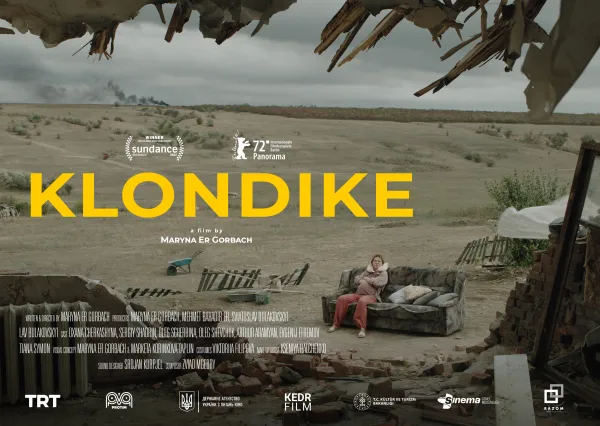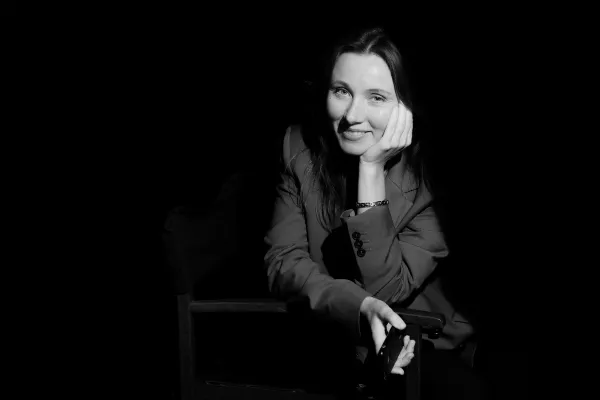If it’s true, as General William Tecumseh Sherman reputedly observed during America’s Civil War, that “war is hell,” according to Kyiv-born Maryna Er Gorbach’s Klondike, the “hottest seat in hell” (to paraphrase Dante) seems reserved for those ensnared in the civil war in eastern Ukraine’s Donetsk region. One of the grimmest films I’ve ever seen, Klondike is so bleak in its realistic depiction of warfare that it almost makes two antiwar classics that won Best Picture and Best Director Oscars – Lewis Milestone’s1930 All Quiet on the Western Front and Oliver Stone’s 1986 Platoon – look like musical comedies in comparison.
As Oksana Cherkashyna, who stars as Irka, told the audience after a SEEfest screening at the Lumiere Cinema in Beverly Hills, Klondike dramatizes actual events that took place when the war between Russia and Ukraine really “started eight years ago” in 2014, with armed conflict in the Donbas, while what we’re witnessing now is “a full-scale invasion” by the Russian Federation of Ukraine.
Despite the fact that her character is clearly pregnant, Cherkashyna said, “I play a woman who refused to evacuate,” even after the front wall of her rural home is blown up by what appears to be an errant missile or artillery shell shortly after the movie begins. “The director used documental facts to create a story [involving] a devastating missile attack [that was] a mistake,” explained Cherkashyna. But since “the start of the invasion on February 21 [2022], there’s no mistake. The Russians know exactly where they are bombing,” asserted the outraged Kharkiv-born actress, who studied at the Kyiv Academic Drama and Comedy Left Bank Theatre.
Irka’s husband Tolik (Sergey Shadrin, who passed away after Klondike was shot) and brother Yarik (Oleg Shcherbina) both insist that she evacuate the war-torn area, where armed Russian separatists are clashing with Ukrainians who remain faithful to the central government based in Kyiv. Sometimes it’s hard to tell who is on whose side; as the story unfolds, Yarik even questions Tolik’s loyalties at gunpoint. In this sense Klondike me of the 1961 TV series The Americans, featuring two brothers who fight on opposite sides during the U.S. Civil War.
Further complicating the conflict between pro-Russian militias and Ukrainian loyalists is the mysterious downing of the commercial Malaysia Airlines MH17 flight traveling from Amsterdam to Kuala Lumpur over the strife-ridden region, resulting in the deaths of almost 300 civilian passengers. At one point in Klondike Dutch parents arrive to search in vain for the remains of their child, as tragedy compounds tragedy.
Much of the cinematography throughout Klondike is indistinct, with long pans and tracking shots. Director of Photography Sviatoslav Bulakovskyi’s skillful camerawork expresses the disoriented, confused mindset of humans besieged by battle in this film for which Maryna Er Gorbach won a Directing Award World Cinema Dramatic at the Sundance Film Festival. They have found a way to lens the unrelenting, sheer misery and discombobulation of warfare in the format of a feature (as opposed to a documentary). The Istanbul Film Festival awarded Bulakovskyi its well-deserved Best Cinematographer accolade, another of the many prizes and nominations Klondike earned.
As her name suggest in English, Irka is irksome (although others may prefer to describe her as “feisty” and even “plucky”). In addition to refusing to leave her village near the Ukraine/Russia border, Irka declines to have sex with her husband. It’s interesting to note that Cherkashyna is also co-starring in an updated 2022 Ukrainian version of Shakespeare’s The Taming of the Shrew (see: https://www.imdb.com/title/tt15565412/?ref_=nm_ov_bio_lk2), as Irka and Tolik’s tempestuous relationship is somewhat similar to that of Petruchio and Kate’s.
During the Q&A after Klondike’s premiere screening in Los Angeles, Cherkashyna discussed the stubborn Irka’s decision to not leave her village: “If it was me, I would leave right away. It’s scary. My family refuses to evacuate Kharkiv.” The 33-year-old said she even tried to cajole her relatives into fleeing by threatening to commit suicide, and yet they steadfastly remained put.
Cherkashyna revealed that Klondike was not actually shot on location in a war zone, but rather “near Odessa. It is really dangerous to film in occupied territory. I did it before but when I heard bombs I said ‘never again’.” The actress was apparently referring to 2020’s Bad Roads, which took place in the Donbas during wartime and for which Cherkashyna won the Ukrainian Film Critics Award and was also nominated for the Ukrainian Film Academy Awards’ “Golden Dziga,” an award named in honor of the great Soviet documentarian Dziga Vertov.
Regarding the intransigence and resistance of her compatriots in the face of the Russian invasion, Cherkashyna stated, “That’s what I like about Ukrainians. They’re still fighting. It’s an irrational feeling I feel after the invasion started [in February 2022]. It’s hard to understand why my father refuses to evacuate.”
And the pregnant Irka is the quintessential expression of this tenacity, of people fighting for their land and adamantly refusing to be uprooted from their ancestral home, no matter what, come hell or high water. Despite all of the unrelieved despair and horrors of the atrocities depicted onscreen, Klondike somehow manages to end on an extremely symbolic, evocative note of hope.
During the Q&A at the Lumiere Cinema named after those pioneering brothers who helped create the new art form of motion pictures in 1895, Cherkashyna humorously revealed: “I was not pregnant. I wore a special silicon belly that looked realistic. I enjoyed being in public feeling the privilege of being pregnant in Kyiv,” while wearing her stunt stomach.
Offscreen, Cherkashyna’s own sense of optimism was shattered by reality. “I dreamed that after the premiere the war [in the Donbas] would be over. That was my motor force. It gave me hope as a Ukrainian person.” But after the film wrapped, this chimera was dashed by the escalation of conflict between Ukraine and Russia when Putin’s armed forces launched their full-fledged assault on its beleaguered, smaller neighbor.
I told Cherkashyna that I was “descended from Kyiv and Odessa ancestors and had learned more about my ancestral homeland in the past three months than in my entire life. I’ve heard it said that ‘Ukrainians and Russians are culturally’ different. How?” Cherkashyna replied: “That’s something that developed over hundreds of years and there’s no time to go into that here. The point is that Ukraine is a sovereign state,” and as such, its borders deserve to be recognized and respected.
Klondike may be an ironic title for this hard-hitting movie, set far from the goldfields of Alaska. Is the film’s screenwriter and helmer suggesting that wherever your home is, that’s where you’ll find your Klondike, your pot of gold? In any case, Irka’s struggle to survive and remain where she was born and raised gives new meaning to that ice cream advertising slogan: “What would you do for a Klondike bar?”
Writer/director Maryna Er Gorbach studied at the Kyiv National I. K. Karpenko-Kary Theatre, Cinema & Television University, Ukraine and graduated from Andrzej Wajda Master School of Film Directing, Poland. One could say that the gifted Gorbach is continuing Mikhail Gorbachev’s “glasnost” ethos of opening up into the post-Soviet era. Klondike arguably perpetuates the artistic filmmaking legacy of the famed Ukrainian director Aleksandr Dovzhenko and is a perfect example as to why specialty film fetes such as the 17th annual South East European Film Festival play such an indispensable role – bringing top notch motion pictures to the world’s putative capital of movies that L.A. audiences, including members of the film/TV industry, may otherwise never get an opportunity to see on the big screen. Hopefully this will lead to films such Klondike as being released theatrically and on other platforms in the U.S.
Klondike is in Ukrainian, Russian, Chechen and Dutch and is 100-minutes long. For more info see: https://seefilmla.org/; https://klondikemovie.com/.




